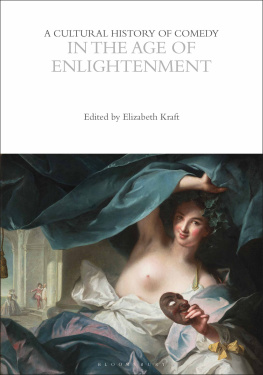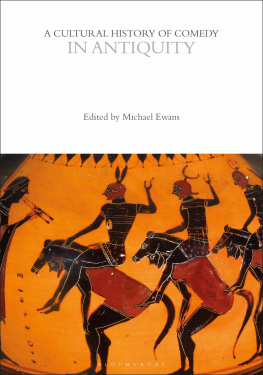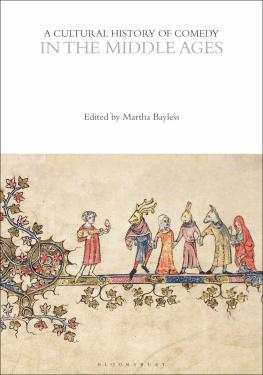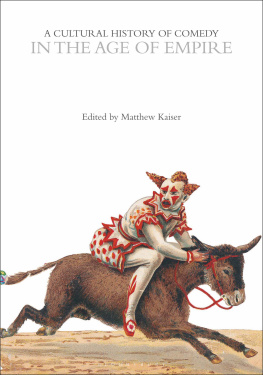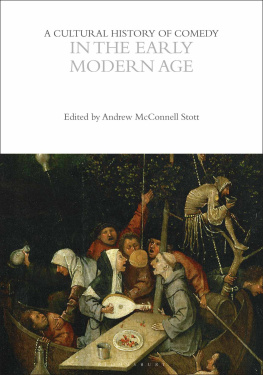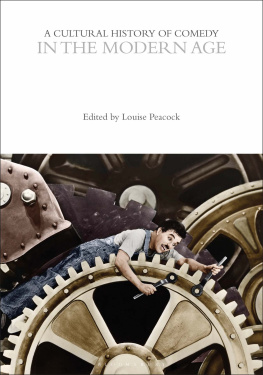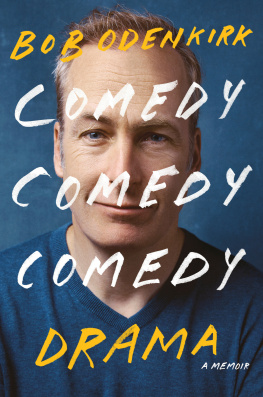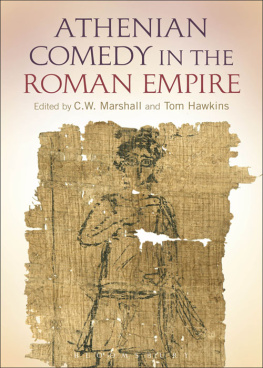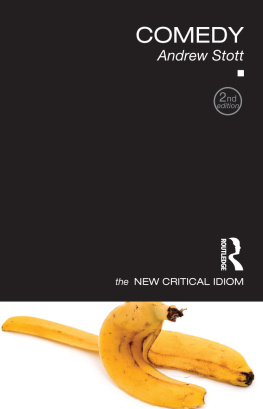
A CULTURAL HISTORY
OF COMEDY
VOLUME 4
A Cultural History of Comedy
General Editors: Andrew McConnell Stott and Eric Weitz
Volume 1
A Cultural History of Comedy in Antiquity
Edited by Michael Ewans
Volume 2
A Cultural History of Comedy in the Middle Ages
Edited by Martha Bayless
Volume 3
A Cultural History of Comedy in the Early Modern Age
Edited by Andrew McConnell Stott
Volume 4
A Cultural History of Comedy in the Age of Enlightenment
Edited by Elizabeth Kraft
Volume 5
A Cultural History of Comedy in the Age of Empire
Edited by Matthew Kaiser
Volume 6
A Cultural History of Comedy in the Modern Age
Edited by Louise Peacock

CONTENTS
INTRODUCTION
Geraldine McEwan, Ralph Richardson, and John Gielgud in School for Scandal.
William Hogarth, Characters and Caricaturas.
William Hogarth, Marriage A-la-Mode, toilette scene.
Hugh Thomson, Oliver Goldsmiths She Stoops to Conquer Act 2, Scene 1.
Joshua Reynolds, David Garrick between Tragedy and Comedy.
CHAPTER ONE
Dame Edith Evans as Lady Fidget in William Wycherleys The Country Wife.
Johann Zoffany, a scene from Love in a Village.
William Hogarth, The Authors Benefit Pasquin.
School For Scandal.
Thomas Rowlandson, illustration to Henry Fieldings Adventures of Joseph Andrews, and his friend Mr Abraham Adams.
CHAPTER TWO
Le Cid, title page.
The Dutch burning English ships during the Raid on the Medway.
Oberon, Titania, and Puck with dancing fairies.
CHAPTER THREE
William Hogarth, Strolling Actresses Dressing in a Barn.
Interior of Drury Lane, 1804.
Exterior of Covent Garden Theatre.
Frontispiece, The Devil to Pay.
Harlequin.
Frances Abington as Phillis in The Conscious Lovers.
CHAPTER FOUR
J. E. Millais, Rosalind, and Celia.
Hugh Thomson, illustration, She Stoops to Conquer Act 3, Scene 1.
The Buck Metamorphosed or Mr Foote in the character of the Englishman returnd from Paris, 1754.
The Masque, c. 1650.
David Garrick and Hannah Pritchard in The Suspicious Husband.
CHAPTER FIVE
Charlotte Munson (Miranda), Charles Pasternak (Marplot), and Brian Mani (Sir Frances) in The Busy Body.
Illustration of characters from the Commedia dellarte play.
Lauren Pennline (Isabinda), Emily Kicklighter (Patch), and Terry Weber (Sir Jealous) in The Busy Body.
Joshua Reynolds, Mrs. Abington as the Comic Muse.
Jeff Dickamore (Sir George), Charlotte Munson (Miranda), and Brian Mani (Sir Francis) in The Busy Body.
Jeff Dickamore (Sir George) and Charlotte Munson (Miranda)in The Busy Body.
Charles Pasternak (Marplot) and Charlotte Munson (Miranda) in The Busy Body.
Jeff Dickamore (Sir George), Jude Vincent (Charles), and Charles Pasternak (Marplot) in The Busy Body.
CHAPTER SIX
Idol Worship or the way to preferment, c. 1740.
An official print commemorating and celebrating the birth of the kings son, James Francis Edward, in June 1688.
Satirical print of Mary of Modena with infant James Stuart and Father Petre.
The Cobler of Preston, frontispiece.
The Festival of the Golden Rump (1737).
John of Gaunt in Love, Or Mars on his knees (1749).
CHAPTER SEVEN
Thomas Rowlandson, Laughter (1800).
James Caldwall, Simia quam similis turpissima bestia nobis (1798).
Three grotesque heads of big-nosed old men, laughing, c. 172066.
George Cruickshank, Laugh & Grow Fat [1818?].
CHAPTER EIGHT
Francis Hayman, The Expulsion (1749).
William Hogarth, The Funeral of Chyrstom & Marcella vindicating herself.
The Tub Preacher, Tale of a Tub.
Morea le Jeune, ejection of Candide from the Barons Castle.
Yorik, The Monk, and Madame Lin the inn courtyard at Calais.
Misty G. Anderson is the James R. Cox Professor of English at the University of Tennessee, Knoxville, where she also holds courtesy appointments in the departments of Theater and Religious Studies. Anderson is the author of Imagining Methodism in Eighteenth-Century Britain: Enthusiasm, Belief, and the Borders of the Self (2012) and Female Playwrights and Eighteenth-Century Comedy: Negotiating Marriage on the London Stage (2002), as well as numerous articles on performance and gender in the long eighteenth century. She is a co-editor of the new Routledge Anthology of Restoration and Eighteenth-Century Drama and Performance (2017 and 2019) along with Kristina Straub and Danny OQuinn. She has worked as a dramaturg for the Clarence Brown Theatre and produced a documentary about their 2017 production of The Busy Body. She is currently completing a third book project, God on Stage.
Andrew Benjamin Bricker is an assistant professor of English Literature in the Department of Literary Studies at Ghent University, in Belgium. His forthcoming book, Libel and Lampoon: Satire in the Courts, 16701792, is about satire and the development of defamation law.
Brian Corman is Professor Emeritus of English at the University of Toronto. His work is largely on drama, fiction, and literary theory. His publications include Genre and Generic Change in English Comedy, 1660-1710, Women Novelists before Jane Austen: The Critics and Their Canons, and (as editor) The Broadview Anthology of Restoration and Eighteenth-Century Comedy.
Aparna Gollapudi is Associate Professor of English at Colorado State University. Her book Moral Reform in Comedy and Culture, 16961742 (2011) discusses the socio-political and performative implications of reform plots in early eighteenth-century comedies by playwrights such as Cibber, Steele, Centlivre, Johnson, and Hoadly. In addition she has worked on eighteenth-century child performers and representations of children in a variety of cultural narratives, from legal and literary to political and economic.
Elizabeth Kraft is Professor of English at the University of Georgia. She is author of Character and Consciousness in Eighteenth-Century Comic Fiction (1992), Laurence Sterne Revisited (1996), Women Novelists and the Ethics of Desire (2008), and Restoration Stage Comedies and Hollywood Remarriage Films (2017).
Heather Ladd is Associate Professor of English at the University of Lethbridge, where she teaches and researches Restoration and eighteenth-century literature. Her scholarship has appeared in journals including ABO: Interactive Journal for Women in the Arts, 16401830, Authorship, Literary Imagination, and Theatre Notebook. Recently, alt.theatre, a Canadian theater magazine, published her stage adaptation of Charlotte Charkes autobiography, which she has performed. She is currently co-editing (with Leslie Ritchie) a collection on English theatrical anecdotes.
Next page
